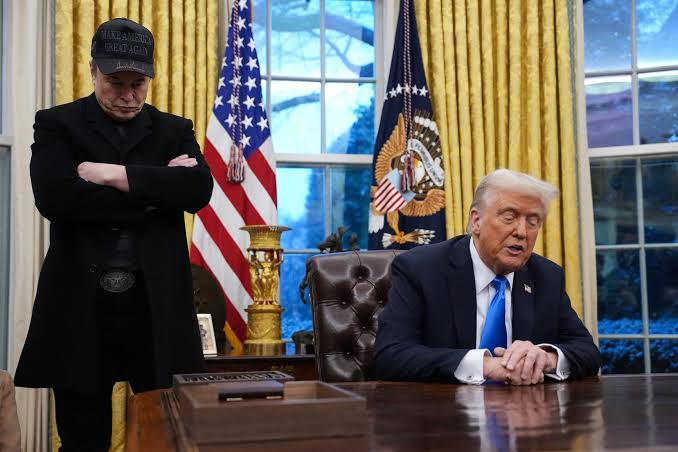Facebook Twitter (X) Instagram Somali Magazine - People's Magazine
In a sweeping move to downsize the U.S. federal workforce, President Donald Trump and his adviser Elon Musk have overseen the termination of more than 9,500 employees across multiple government agencies. Workers from the Departments of Interior, Energy, Veterans Affairs, Agriculture, and Health and Human Services were dismissed on Friday as part of an aggressive effort to reduce government bureaucracy. These layoffs are in addition to the estimated 75,000 employees who have voluntarily accepted buyouts offered by the administration.
The job cuts, which affect approximately 3% of the 2.3 million-strong civilian federal workforce, have sparked intense debate. While Trump argues that excessive government spending and inefficiency necessitate these reductions, congressional Democrats claim the administration is overstepping its authority and undermining crucial government functions. Meanwhile, most Republican lawmakers have supported the moves, seeing them as a necessary step toward fiscal responsibility.
Elon Musk’s role in this initiative, particularly through his so-called Department of Government Efficiency (DOGE), has drawn scrutiny. Reports suggest that Musk and his team, largely composed of young engineers with little government experience, are making broad cuts based on ideology rather than fiscal pragmatism. White House insiders have also noted growing frustration with Musk’s approach, including concerns from Chief of Staff Susie Wiles about the lack of coordination in executing the layoffs.
The impact of these job reductions is being felt across key agencies. The U.S. Centers for Disease Control and Prevention and the National Institutes of Health are set to lose nearly half of their probationary employees. The U.S. Forest Service has terminated approximately 3,400 new hires, while the National Park Service has laid off 1,000 workers. The Internal Revenue Service is also preparing to fire thousands of employees in the coming weeks, potentially straining resources ahead of the April 15 tax filing deadline.
Beyond job cuts, the administration has moved to weaken civil-service protections, freeze most U.S. foreign aid, and shut down agencies such as the U.S. Agency for International Development (USAID) and the Consumer Financial Protection Bureau (CFPB). These actions have raised concerns that essential services, including disaster response and regulatory oversight, are being compromised. For example, wildfire recovery efforts in California have been hampered by hiring freezes for seasonal firefighters and a halt in removing hazardous debris from forests.
The strategy has alarmed many former and current federal employees. Nick Gioia, a U.S. Army veteran who worked for the Department of Defense for 17 years before joining the USDA’s Economic Research Service in December, was among those abruptly fired. Expressing his frustration, Gioia described the mass layoffs as a political maneuver rather than a genuine effort to reform government operations.
Labor unions and advocacy groups have condemned the job cuts, arguing that they disproportionately affect workers in essential public services while benefiting corporate interests. Steve Lenkart, executive director of the National Federation of Federal Employees, believes the ultimate goal is to deregulate industries and remove government oversight in ways that favor wealthy business leaders like Musk.
Legal challenges have already emerged. Some terminations, particularly at the Department of Energy, have been partially reversed due to concerns over national security. Among the roughly 2,000 Energy Department employees laid off, 325 were from the National Nuclear Security Administration, which oversees the U.S. nuclear arsenal. Sources indicate that at least some of these layoffs have been rescinded to maintain critical security operations.
Additionally, a federal judge in New York has temporarily blocked DOGE from accessing Treasury Department systems, citing concerns over privacy and financial oversight. The administration has also agreed to pause layoffs at the CFPB following a court order. Meanwhile, unions representing federal employees have filed lawsuits to challenge the legality of the buyout program.
Despite mounting resistance, the Trump administration appears committed to its restructuring plan. Treasury Secretary Scott Bessent has likened Musk’s role to that of an auditor identifying inefficiencies, while Musk himself continues to defend the cuts as necessary to streamline government operations. However, critics argue that the aggressive approach risks dismantling essential services and eroding the stability of the federal workforce.
As the administration pushes forward, the long-term consequences of these cuts remain uncertain. While supporters view them as a necessary step toward reducing government spending, opponents warn that the rapid downsizing could have far-reaching implications for national security, public health, and economic stability.

